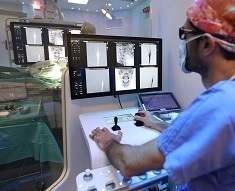
Robocath has today announced the results of its CARE clinical trial focusing on robotic carotid stenting—the first phase of a research programme launched in July 2021 by Robocath and Rennes University Hospital (Rennes, France), which, in the long term, is aiming to enhance current and future generations of robots used in the treatment of neurovascular diseases.
The prospective, single-arm, non-randomised CARE trial, launched in November 2021, saw François Eugène and Quentin Alias (both Rennes University Hospital, Rennes, France) perform a total of seven robotic procedures using R‑One, an innovative robotic platform developed and marketed by Robocath. This first-generation robot is designed to improve treatments by enhancing physicians’ hand gestures through increased precision, as well as drastically reducing medical staff’s exposure to X-rays.
According to Robocath, all procedures in the CARE trial were performed without any medical complications, giving R-One a 100% clinical success rate. From a technical standpoint, only one of the procedures required a complete manual conversion.
“I am honoured to have been part of this clinical trial, which marks an important first step on the road to making robotic procedures routine practice for the treatment of strokes,” said Eugène. “The success of these procedures is down to two key factors: accuracy and speed of patient care. Just like human hands, Robocath’s robot can move with millimetre precision and ensure the instruments remain in a fixed position for the entire duration of the procedure. Moreover, the technology opens up the possibility of long-distance treatment for stroke patients.
“Given these advantages, I believe that, in the years to come, robotic technology will be a driver of change in our patient care. Thanks to this technology, we can make treatment more effective and offset the unequal distribution of resources which currently leaves many stroke patients without access to a local treatment centre. Robotics has the power to bring equal access to treatments to all patients across France and in other countries facing similar public health challenges.”
“In our line of work, precision is key to the success of each intervention,” Alias added. “I am impressed by the pinpoint accuracy of the robot’s movements. The use of robotics could become, in time, the go-to treatment option for vascular diseases.”
“Conducting this first study in interventional neuroradiology was an essential step in the development of our robotic platform,” said Lucien Goffart, CEO of Robocath. “Since then, we have worked hard to integrate the expectations of users in order, ultimately, to offer them an intelligent robotic solution they can use in their daily practice to the patient’s benefit.”













